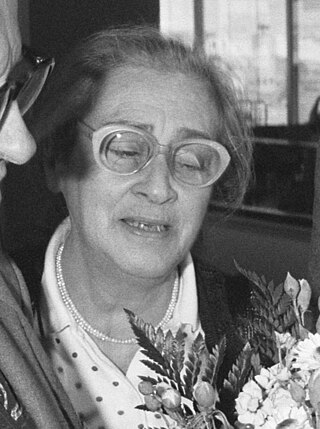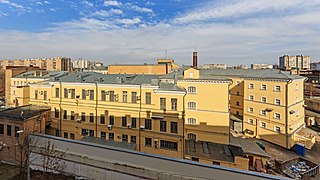The Jackson–Vanik amendment to the Trade Act of 1974 is a 1974 provision in United States federal law intended to affect U.S. trade relations with countries with non-market economies that restrict freedom of Jewish emigration and other human rights. The amendment is contained in the Trade Act of 1974 which passed both houses of the United States Congress unanimously, and was signed by President Gerald Ford into law, with the adopted amendment, on January 3, 1975. Over time, a number of countries were granted conditional normal trade relations subject to annual review, and a number of countries were liberated from the amendment.
![<i>Moscow Does Not Believe in Tears</i> 1980 [[Soviet Union]] film](https://upload.wikimedia.org/wikipedia/en/a/a3/Moscow_for_US.jpg)
Moscow Does Not Believe in Tears is a 1980 Soviet romantic drama film made by Mosfilm. It was written by Valentin Chernykh and directed by Vladimir Menshov. The leading roles were played by Vera Alentova and Aleksey Batalov. The film won the Academy Award for Best Foreign Language Film in 1981.

Yelena Georgiyevna Bonner was a human rights activist in the former Soviet Union and wife of the physicist Andrei Sakharov. During her decades as a dissident, Bonner was noted for her characteristic blunt honesty and courage.

Malcolm Toon was an American diplomat who served as a Foreign Service Officer in Moscow in the 1950s, 1960s, and 1970s, during the Cold War, ultimately becoming the ambassador to the Soviet Union.

Lefortovo Prison is a prison in Moscow, Russia, which has been under the jurisdiction of the Russian Ministry of Justice since 2005.

Yelena Alekseyevna Koreneva is a Soviet and Russian stage and film actress, writer, film director, and screenwriter.
Zoya Alexandrovna Krakhmalnikova was a Russian Christian writer, of Ukrainian origin. She was an activist and former Soviet dissident who was repeatedly arrested by the authorities of the former Soviet Union for her publications. She was a recipient of the Andrei Sakharov Prize for Writer's Civic Courage.

Admiral is a 2008 biopic about Alexander Kolchak, a vice admiral in the Imperial Russian Navy and leader of the anti-communist White movement during the Russian Civil War. The film also depicts the love triangle between the Admiral, his wife, and the poet Anna Timiryova.
Counterplan is a 1932 Soviet drama film directed by Sergei Yutkevich and Fridrikh Ermler.
Vladimir Abramovich Rapoport was a Soviet cinematographer, known for his collaboration with film director Sergei Gerasimov.

Victoria Fyodorova was a Russian-American actress and author. She was born shortly after World War II to Jackson Tate (1898–1978), then a captain in the United States Navy, and Russian actress Zoya Fyodorova (1909–1981), who had a brief affair before Tate was expelled from Moscow by Joseph Stalin. Victoria Fyodorova wrote the 1979 book, The Admiral's Daughter, which was about her experience attempting to reunite with her father.

Jackson Rogers Tate was a United States Navy admiral who began his naval career as an enlisted man and became one of the first naval aviators. He fathered a child, Victoria, during a brief love affair with Russian actress Zoya Fyodorova near the end of World War II, but did not know of her birth until 1973. He waged a successful two-year diplomatic quest for her to be allowed to visit him in the United States, finally meeting her in 1975. Her story is told in The Admiral's Daughter.

Zoya Alekseyevna Fyodorova was a Russian film star who had an affair with American Navy captain Jackson Tate in 1945 and bore a child, Victoria Fyodorova in January 1946. Having rejected the advances of NKVD police head Lavrentiy Beria, the affair was exposed resulting, initially, in a death sentence later reprieved to work camp imprisonment in Siberia; she was released after eight years. She was murdered in her Moscow apartment in 1981. The year before Fyodorova was murdered, she appeared in Moscow Does Not Believe in Tears, which won an Academy Award for Best Foreign Language Film in 1980.

Mikhail Mikhailovich Kozakov was a Soviet, Russian and Israeli film and theatre director and actor.
Andrei Nikolayevich Tverdokhlebov was a Soviet physicist, dissident and human rights activist. In 1970, he founded - along with Valery Chalidze and Andrei Sakharov - the Committee on Human Rights in the USSR. In 1973, Tverdokhlebov - along with Valentin Turchin - founded the first chapter of Amnesty International in the Soviet Union. He also helped found Group 73, a human rights organization that helped political prisoners in the Soviet Union. He was the author/editor of several samizdat publications while in the Soviet Union, which were compiled in the book, "In Defense of Human Rights", published by Khronika Press, New York, in 1975.

Ronald James Kurth was a rear admiral of the United States Navy. His career included service in the Cold War and Vietnam War. A naval aviator and Russian area studies scholar fluent in the Russian language, he served on diplomatic posts in Moscow and on the staff of the Chief of Naval Operations and was President of the Naval War College.

Admiral Oktyabrsky was a Project 1134A Berkut A -class cruiser of the Soviet Navy, which briefly became part of the Russian Navy. The sixth ship of her class, the ship served mostly during the Cold War, from 1973 to 1993.
Adult Children is a 1961 Soviet teen comedy-drama film directed by Villen Azarov.
![<i>Two in Love</i> 1965 [[Soviet Union]] film](https://upload.wikimedia.org/wikipedia/en/2/2c/Two_in_Love_Bogin.jpg)
Two in Love is a 1965 Soviet short romantic drama film directed by Mikhail Bogin.

Zoya Yunoevna Semenduyeva was a Soviet and Israeli poet. She wrote in a language of the Mountain Jew (Juhuri). She was a member of Dagestan Writers' Union.

![<i>Moscow Does Not Believe in Tears</i> 1980 [[Soviet Union]] film](https://upload.wikimedia.org/wikipedia/en/a/a3/Moscow_for_US.jpg)











![<i>Two in Love</i> 1965 [[Soviet Union]] film](https://upload.wikimedia.org/wikipedia/en/2/2c/Two_in_Love_Bogin.jpg)
